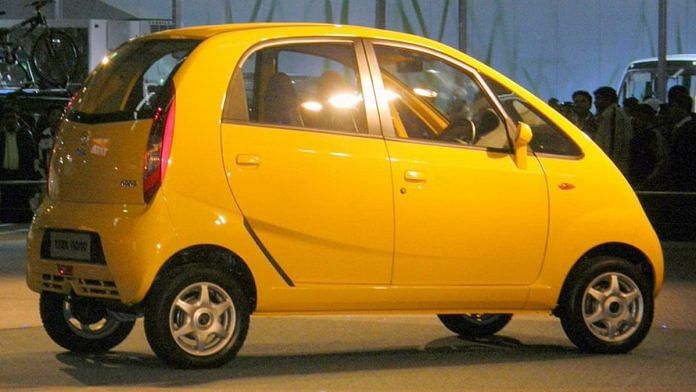New Delhi: In its filing to the National Stock Exchange Monday, Tata Motors said an arbitral tribunal has ruled in its favour in a dispute case related to claims for its now-closed Singur manufacturing unit in West Bengal. The victory, against the West Bengal Industrial Development Corporation Limited (WBIDC), entitles the auto major to recover Rs. 766 crore from WBIDC.
The decision, which comes almost 15 years after Tata Motors decided to relocate its Nano project from Singur, West Bengal, to Sanand, Gujarat, following the “heightened level of agitation and hostility by the [then] opposition parties [in West Bengal]”, also entitles Tata Motors to charge an 11 percent interest on the amount, from 1 September, 2016, till actual recovery, along with Rs 1 crore towards the cost of the proceedings.
ThePrint has reached WBIDC on email for comment. The report will be updated if a response is received.
The then Tata Group chairman Ratan Tata had in May 2006 announced setting up of its first plant in West Bengal. The project for the manufacturing of small cars, dubbed the Nano project, was to come up at Singur in Hooghly district, which is around 45 kilometres from Kolkata.
The announcement, which Tata had then said was “a reflection of the confidence that the Tata Group has in the investment climate and the Government of West Bengal”, coincided with then West Bengal Chief Minister Buddhadeb Bhattacharjee taking oath for the second term.
However, the construction of the project was mired in controversy with violent protests over acquisition of land for the project by the state government.
The then opposition in West Bengal, led by All India Trinamool Congress chief Mamata Banerjee, alleged that owing to the project almost 6,000 families, including many agricultural workers and marginal peasants, would lose their land and livelihoods. They argued that no compensation was given to landless agricultural workers and other rural households who were indirectly dependent on agricultural activities for their livelihood. Additionally, they alleged that the landowners too had also expressed unwillingness to give their land.
According to Tata Motors, they had invested nearly Rs 1,800 crore in establishing the plant spread over an area of 700 acres. The manufacturing unit, which was expected to create employment for 10,000 people, was to be commissioned in 2008, however, faced with continued protests and hostility over land acquisition, the Tata Group instead announced plans to relocate the Nano plant from Singur.
Amid continued “confrontation and agitation”, the company had to suspend work at the plant in September 2008 — after two years of construction work. It alleged violent obstruction of its employees and contract labour from reporting to work and also raised concerns over “existing environment of obstruction, intimidation and confrontation”.
With no signs of de-escalation in situation, the company, in October 2008, announced that it would move the project out of West Bengal due to “the heightened level of agitation and hostility by the opposition parties led by Ms. Mamata Banerjee, resulting in a concern for the physical security of their staff, contractors and vendors. Threats, intimidation and instances of assault and general obstruction in one form or the other have been the order of the day”.
It had added that the Trinamool Congress and those supporting them, continue to demand a part of the land to be returned to the farmers by the government, which would render the project unviable. It stressed that the decision was taken “entirely due to the continued agitative actions by the opposition party led by Ms. Mamata Banerjee with total disregard for the rule of law”.
Also read: India is ready for microcars – and it won’t settle for a cheap-looking Tata Nano this time
The legal tussle
Meanwhile, amid the controversy over the production plant, Tata Motors unveiled its Nano car in January 2008 during the 9th Auto Expo in New Delhi. Later, in March 2009, it announced the commercial launch of Tata Nano and said that the car was being manufactured at the company’s Pantnagar plant in Uttarakhand in limited numbers. The company’s new Nano plant in Sanand in Gujarat was inaugurated in June, 2010.
Mamata Banerjee came to power in West Bengal in 2011, and was sworn in as the Chief Minister, ending 34 years of Left Front rule in the State. The Singur movement is largely believed to have aided her poll victory.
Within a month of her taking office, she introduced the Singur Land Rehabilitation and Development Bill, 2011, which sought to empower the West Bengal government to return land in Singur to farmers. The Bill was passed by the state assembly in June, 2011.
The passing of the bill kickstarted a long legal battle between Tata Motors and the West Bengal State government.
In 2011, Tata Motors moved the Calcutta High Court challenging the law. The Calcutta High Court ruled in favour of the state government. The judgment was challenged by Tata Motors before a division bench of the Calcutta High Court, which held the Singur Land Rehabilitation and Development Act, 2011 as unconstitutional and void.
Post this, the dispute moved to the Supreme Court, which in 2016 termed the acquisition of land in Singur district illegal and void.
In November 2017, Tata said that the company had sought a compensation of about Rs 1,400 crore from the West Bengal government towards losses in the Singur land issue.
According to reports, the company had pressed a claim for compensation for a little under Rs 1,000 crore from the WBIDC, and an arbitral panel comprising three retired judges was to decide whether there were any legal grounds under which the Tatas could press their claim for compensation.
(Edited by Poulomi Banerjee)



